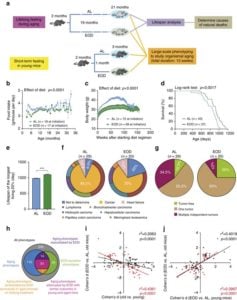Intermittent fasting has become extremely popular in the last few years due to tons of scientifically proven benefits for humans, one of which is obviously weight loss. With these positive effects in mind, you may wonder about the effects of intermittent fasting for dogs and whether it is good or bad for them.
What Is Intermittent Fasting?
Intermittent fasting, or therapeutic fasting as it is sometimes called, is an eating pattern that includes alternating cycles of eating and fasting. There are a few different methods to intermittent fasting, all based on the amount of time that passes between eating cycles.
The most popular method of intermittent fasting for humans is the one in which you eat 8 hours every day and fast for 16 hours, originally developed by Swedish personal trainer and nutritionist Markin Berkhan of Leangains. This basically means skipping breakfast, eating around noon for the first time and not eating anything after 8 pm.
 Intermittent fasting for dogs and time restricted feeding hasn't been researched as well in canines as it has in humans, but there are some studies with animals. For example, one 2017 study shows that it extends lifespan. Veterinarians at Dogs Naturally Magazine has looked into more clinical research on the benefits of fasting for dogs. Dr Karen Becker of Mercola have also published an extensive piece on the ways and benefits of therapeutic fasting in dogs.
Intermittent fasting for dogs and time restricted feeding hasn't been researched as well in canines as it has in humans, but there are some studies with animals. For example, one 2017 study shows that it extends lifespan. Veterinarians at Dogs Naturally Magazine has looked into more clinical research on the benefits of fasting for dogs. Dr Karen Becker of Mercola have also published an extensive piece on the ways and benefits of therapeutic fasting in dogs.
While there are some potential benefits, there could also be side effects and dangers when this diet is administered improperly. It's crucial to discuss this with your veterinarian or canine nutritionist before you attempt to fast your dog.
Many dog owners already feed their dogs just one meal on a daily basis. If that’s the way you feed your pup, another option is trying the 4:3 diet instead, in which you would not feed your pooch for three days a week. If you feed your dog two or three meals a day, try feeding him only once. You can also feed him twice a day, but in the period of 6-8 hours.
Human body, just like the body of dogs and many other animals, uses a few different energy sources. When you fast, your body goes into ketosis, which means that instead of glucose, your body uses fat as an energy source. When the fat breaks down during ketosis, one of the components released are ketones, which are used for fuel. This leads to weight loss and other positive effects.
Is Intermittent Fasting Good for Dogs?
Wild dogs fast as a way of life, just like wolves, the closest living relatives of dogs. A study on of wolves in Yellowstone National Park showed that wolves are adapted to a feast-or-famine diet and that they can overcome long periods without fresh carcasses.
While this is often attributed to the fact that food can often be scarce for predators in nature, this also means that their bodies are naturally equipped to stay healthy during the long periods of fasting. Dogs in the wild usually only have one meal per day and sometimes even go for days without food. Thus there's an argument to be made that intermittent fasting comes naturally to most dogs.
Potential Benefits of Intermittent Fasting for Dogs
More studies on mice and rats have shown that intermittent fasting comes with many benefits, like weight loss or even increased life span. Let’s take a look at things that happen in your dog’s body when he fasts and what positive effect can come of it.
1. Elevated Macrophage Activity
Macrophages present the first line of defense against hazardous particles that reach the body’s interior, like viruses, bacteria and other foreign substances. Macrophages and other components of the immune system digest the dead cells of the body and send them to the digestive system for elimination.
This process is faster and more effective during fasting since catabolism enhances cellular breakdown to be used for fuel. Elevating macrophage activity is usually used as a treatment for different autoimmune diseases, as well as some cancer types.
2. Reduced Insulin Levels
Regular fasting can reduce insulin levels, which can lead to weight loss and a decrease in systemic inflammation.
Insulin carries sugars into cells and keeps it there, which is one of the more common causes of gaining body weight. When insulin levels are reduced, sugar gets burned for energy, which can help your dog lose weight.
3. Increased Immunoglobulin Levels
Immunoglobulins are also known as antibodies and they are used by the immune system to neutralize pathogens like bacteria and viruses and provide passive immunity to numerous diseases, like immune-mediated hemolytic anemia.
Fasting can increase the number of immunoglobulins and improve your dog’s immune system and resistance to various diseases.
4. Tissue Regeneration
When your dog is left without food for an extended time, his body will start killing of damaged cells and use them or energy. Once you feed your dog again, the stem cells replace the cells his body cannibalized with new, healthy cells.
This process of cleaning the old cells out of the body is called autophagy. Recycling and cleaning up of the body’s waste and cellular debris that build up over time can help improve your dog’s immune system.
5. Increased Natural Killer Cell Activity
Natural killer cells, which were first discovered in 1975, are found in the blood and lymphoid tissues. They can kill tumor cells, as well as cells infected with viruses and fasting can enhance their activity.
6. Prevention of Neurological Diseases
A study by Mark Mattson, a professor of neuroscience at the Johns Hopkins School of Medicine, indicates that fasting can be beneficial for your dog’s neurological health. In fact, research showed that intermittent fasting can help a brain in the fight against neurodegenerative diseases like Alzheimer’s and Parkinson’s.
While dogs don’t suffer from these exact diseases, they can suffer from other neurological problems and intermittent fasting may help in their prevention.
Can Intermittent Fasting Be Bad for Your Dog?
 Yes, when done incorrectly or when attempted with dogs that should not be fasted, such as puppies, senior dogs or unhealthy canines. Overall, fasting is generally safe and beneficial for dogs when done carefully, but it can be harmful in some specific cases. Only healthy adult dogs should be fasting.
Yes, when done incorrectly or when attempted with dogs that should not be fasted, such as puppies, senior dogs or unhealthy canines. Overall, fasting is generally safe and beneficial for dogs when done carefully, but it can be harmful in some specific cases. Only healthy adult dogs should be fasting.
Puppies, for example, require as much food as they can eat because they are growing. Lactating females, old dogs and small dog breeds prone to hyperglycemia should also avoid fasting. The same goes for dogs with health conditions for which fasting is contraindicated.
You should always consult your vet first before you start fasting your dog to make sure that it’s safe for him.
Intermittent fasting for dogs comes with many potential benefits, like weight loss, improved immune system and better health in general. You can choose to feed your dog once or twice a day in 6-8 hour period, or feed him five days a week and let him fast for two. Talk to your vet to be sure it’s safe for your dog to fast.
READ NEXT: Keto Diet for Dogs – Good or Bad?















